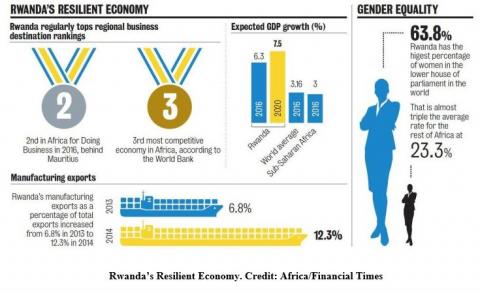RWANDA: RISING FROM THE WRECKS OF THE GENOCIDE
 Submitted by jbimokola on
Submitted by jbimokola on

In summary
- Rwanda is one of the Central and East African countries with rapid economic growth with GDP growth of 8% per year between 2001 and 2014.
- However, it still experiences mild range of poverty among its citizens with most people depending on the returns from their subsistence farms.
- Most economic, social and political reforms are geared towards uniting the nationals and anti-genocide tendencies.
Full multimedia story on rwanda-rising-from-the-wrecks-of-the-genocide
Rwanda has just moved 24 years from a massive and destructive genocide but it is already manifesting a great development in its social, economic and political sectors surpassing most African countries that have experienced little or no such a catastrophe.
Restructuring the country
From the end of the genocide, various strategies have been instituted to help the country move away from wreckage. This has basically been through restructuring the economic, social and political spheres.
In addition, a number of legal reforms were put in place especially the establishment of Gacaca Courts to try genocide cases. The country is also transitioning from a civil law to a mix of both civil and common law which has led to the penal code.
“Divisionism” and “genocide ideology” laws have been instituted to prescribe punishments for offenders attached with tribalism. However, critics say that public officials have misused the laws to fit their selfish interests.
NGOs and international organizations have also joined in the fight against racial and ethnic segregation that led the country into the 1994 catastrophe by making laws that incriminates discrimination.
Booming economy
Despite the fact that the country has scarce resources and a small population of approximately 12.5 million people, it has maintained a steady economy and in 2016 was ranked 43rd and second best country to do business by The Ashish J Thakkar Global Entrepreneurship Index report. Rwanda gets most of its revenue from coffee-and-tea exporting. The good infrastructure is another thing that has kept the country’s economy moving.
However, even with a reduction in the number of people living below the poverty line from 57% in 2005 to 45% in 2010 (World Economic Forum on Africa, 2016), 63% of the population still live in extreme poverty with less than $1.25 income a day.
Agriculture, which is among the major income generating sectors is still practiced at a small scale with only 70% of the 10.5million rural dwellers working on a subsistence farms.
Paul Kagame’s government is putting up strategies to transform Rwanda from a low-income agriculture-based economy to a knowledge-based, service-oriented economy with a middle-income status by 2020.
Education
There have been efforts to increase the number of school-going children and according to the UNESCO report, it is among the top three countries that have made access to education with over 97% school attendance among its children. However, youth in Rwanda still face a problem of unemployment.
Politics
Unlike previous governments, the incumbent has allowed for multiparty democracy and each party is represented within the parliament which has allowed them a voice and to contribute to policy generation.
To the contrary however, many observers have noticed authoritarian tendencies that have started to crop up in Kagame’s regime through an exercise of zero tolerance towards people in the opposition.
Generally, rampant abductions, arrests and detentions of people with views contrary to those of the people in office characterize the Rwanda political environment with the most famous being the arrest of the sole woman candidate in the 2017 presidential race, Diane Rwigara.
Recently on June 18th, 2018, Rwigara’s assets together with some of her family were auctioned to recover the alleged $7m in tax arrears.
Languages
Rwanda is comprised of three (3) tribes; the Hutu, Tutsi and the TWA but almost the entire population speaks Kinyarwanda, which is also an official language alongside French, English, and Swahili.
Brief History
Just like most other African countries, Rwanda was colonized by European powers. This was endorsed in the 1890 Brussels conference in which the nation was placed under the German rule. However, in 1914, the Belgians invaded Rwanda and officially became her colonial power in 1924 by the help of the League of Nations up to 1962 when it attained its independence.
After independence of July 1962, Rwanda decided to establish itself as a republic and the first presidential elections were held on March 10th, 1965. By then, the country was a single party state which acted to the advantage of then sole party leader Grégoire Kayibanda, who became the first Rwandan president.
The country has so far been ruled by four elected presidents including Paul Kagame the current President of Rwanda. Three parties have so far ruled the country, including Party of the Hutu Emancipation Movement (PARMEHUTU), National Republican Movement for Democracy and Development (MRND) and Rwandan Patriotic Front (RPF).
- Log in to post comments
- 871 reads
